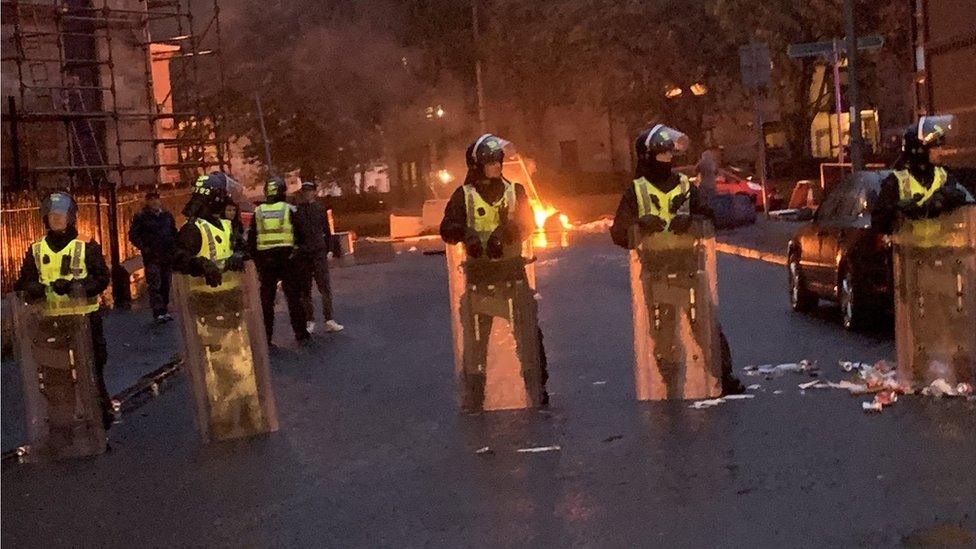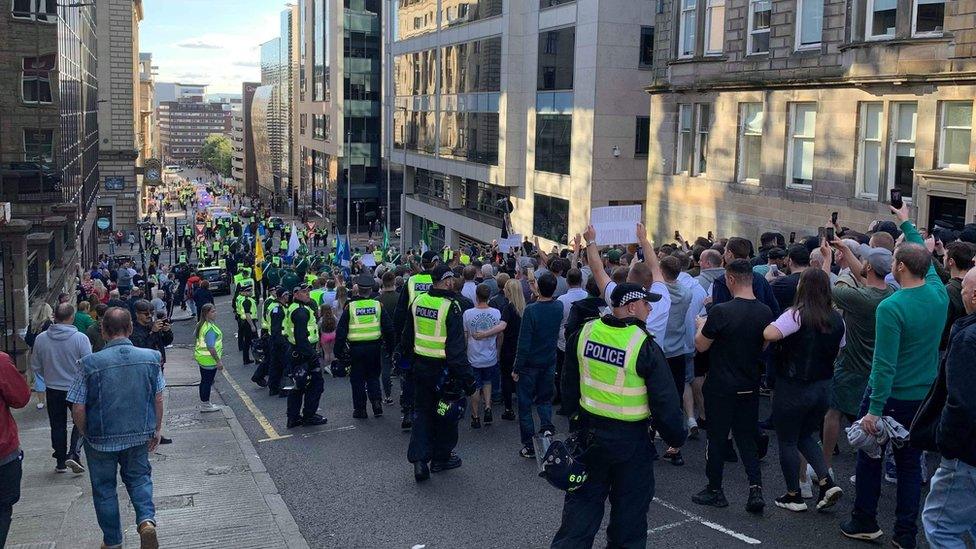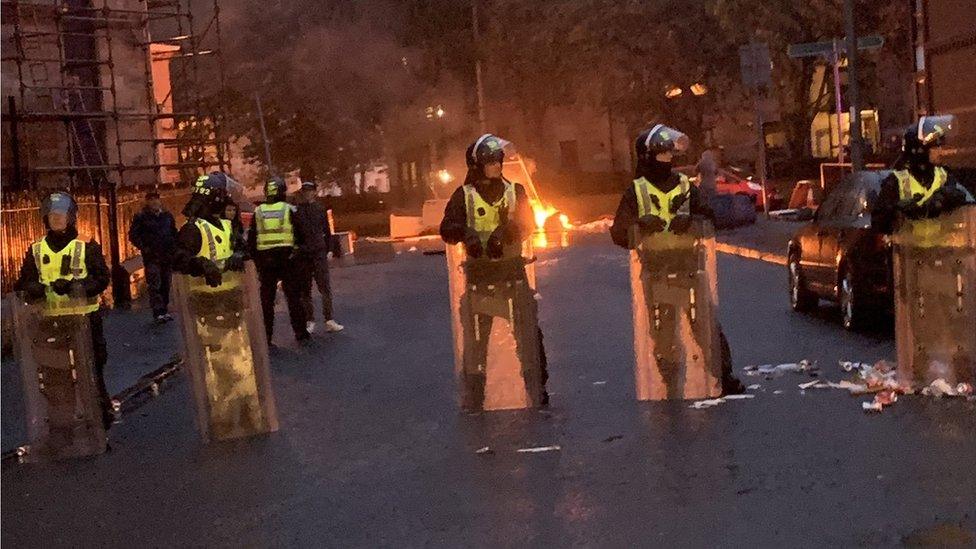Five Glasgow marches banned over sectarian disorder fears
- Published

A march in Govan two weeks ago led to violent disorder
Five marches planned for this weekend have been banned by Glasgow City Council after an emergency meeting.
It follows violent sectarian disturbances at similar events over the past two weekends.
Four Loyalist parades and an Irish Republican march planned for Saturday and Sunday will not be allowed to go ahead due to the threat of trouble.
The decision was taken by an urgently arranged meeting of Glasgow City Council's Public Processions Committee.
In what has been described as an unprecedented move, council officials recommended that all five processions this weekend be prohibited.

A counter-protest on the Broomielaw as a Republican march was held in Glasgow on Saturday
Police said recent events had shown the strong likelihood of disorder in the city at the weekend at one or more of the parades.
Supt John McBride said the number of officers who were to be deployed to the events on Saturday had been doubled following intelligence the force had received.
He said there had been calls on social media from Republicans to target Loyalist events and demands from Loyalists to protest against Republican parades.
'Unacceptable disruption'
A council spokesperson said the committee had acted to protect the interests of communities in Glasgow, "taking into account the threat to public safety and the likelihood of widespread disruption and disorder".
"The city has already witnessed an unacceptable level of disruption and disorder associated with parades and counter-protests in recent weeks," he said.
"It is clear, both from the intelligence gathered by police and the tone of comments made by supporters and protesters, that tensions are high and the situation threatens to deteriorate further.
"The council directly appeals to those who would have taken part in these marches, or who planned to mount protests against them, to comply with the orders made and not bring further disruption to city streets."
The council warned that it would now be a criminal offence for the organisers or any participants to carry out their planned events.
'Not a thing of the past'
Justice Secretary Humza Yousaf said: "The Scottish government fully supports Glasgow City Council taking action to reduce the number of marches going through the city and it is clear that any action must be balanced with the right of everyone to peaceful assembly.
"However, the right to free expression does not give people the right to intimidate communities and the events of the past two weekends have clearly demonstrated that sectarian violence is not a thing of the past.
"As I stated earlier this week, I am open to working with all parties across the chamber to build a consensus on a longer term approach to this absolutely unacceptable disorder."

Planned Loyalist and Republican marches
Saturday 14
Pride of the North Flute Band - 60 expected participants - prohibited
Bridgeton Protestant Boys Flute Band - 300 participants - prohibited
Republican Network for Unity - 150 participants - prohibited
Whiteinch Orange and Purple District 7 - 120 participants - prohibited
Sunday 15
Partick Orange and Purple District 15 - 60 participants - prohibited
Saturday 21
Independent Loyal Orange Order - starts 10am - 50 participants expected
Pride of Govan Flute Band - starts 10am - 800 participants
Drumchapel Orange and Purple District 57 - starts 11am - 120 participants
Springburn Campsie Apprentice Boys of Derry - starts 12pm - 60 participants
West of Scotland Band Alliance - starts 12.30pm - 200 participants
Friday 27
Govan Somme Association - starts 6.15pm - 100 participants
Saturday 5 October
Orange and Purple District No12 LLOL1 - starts 3pm - 110 participants
Saturday 12 October
Bridgeton No Surrender Flute Band - starts 1pm - 350 participants
Royal Black Preceptory 672 - starts 10.25am - 50 participants

Counter-demonstrations
In the Scottish Parliament on Tuesday, Mr Yousaf said the vast majority of Glasgow's population viewed the trouble stemming from the marches as a "stain" on the city's reputation.
On Saturday, a police officer was injured as two Irish Republican marches and Loyalist counter-demonstrations were held in Glasgow.

About 1,000 people were involved in the marches and the counter protests last weekend
The counter demonstrations at both marches were quickly contained by police, who had deployed officers in riot gear and mounted police.
BBC Scotland revealed that it cost about £300,000 to provide 500 specialist public order officers to the two demonstrations at the weekend.
The Scottish Police Federation said that did not include other resources such as the force helicopter, mounted officers and conventional police.
The heavy police presence came a week after a riot developed in Govan when Loyalists tried to disrupt another Irish Republican parade.
In the aftermath of the trouble in Govan, First Minister Nicola Sturgeon condemned the "sectarian disruption" as "utterly unacceptable".
Glasgow City Council responded by saying it planned to stop "morons intent on bringing mayhem to the streets of our city".
However, during September there were nine more marches by Loyalist organisations and two Republican marches planned in the city of Glasgow.
- Published10 September 2019

- Published8 September 2019

- Published31 August 2019
